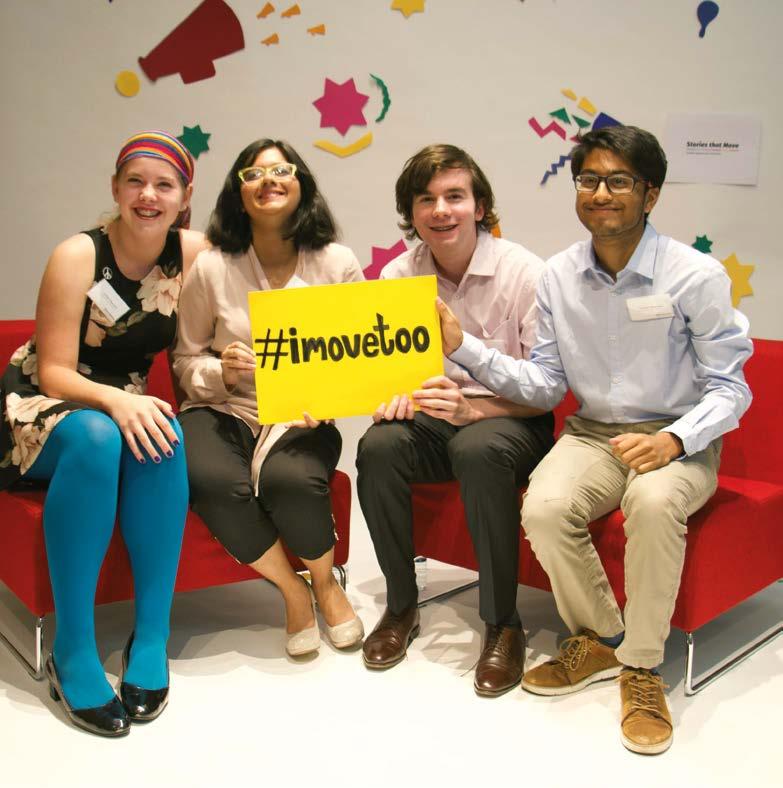
17 minute read
Going to University
For those seeking an English-language study program, the Netherlands is one of the most accessible countries to explore, for a variety of reasons. For starters, over 2,100 courses are on offer here in English, constituting 23% of the bachelor’s degrees on offer here and 74% of the master’s degrees.
Tuition Another reason why studying here is so attractive is because the level of education is high, with some faculties ranking higher than world-famous uni versities across the world, while tuition is relatively low. Students from EEA (Eu ropean Economic Area) countries, Switzerland and Surinam pay a tuition fee of €2,143 (academic year 2020-2021), while students from other countries pay be tween €6,000 and €15,000 for a bachelor’s degree, and between €8,000 and €20,000 for a master’s degree. Compare that to, for instance, $26,000 - $36,000 per year in the US (for non-state residents) and $10,230 for state residents.
Advertisement
International Students There are almost 86,000 non-Dutch nationals in the Dutch universities, from 170 countries, 27% of which are outside Europe. When it comes to bachelor’s degrees, 53% of the international students go to a research university and 47% to a university of applied sciences. While the percentage of international students is 11.5 of all students in the Netherlands, they constitute 23.6% of all students obtaining a research university master’s degree. You’ll notice just how international the Dutch universities are when you visit their so-called open days, where you can follow short classes, meet current stu dents and obtain information about the courses. The pamphlets are available in English, many of the introductory classes are given in English and, among the cur rent students grabbing a bite to eat in the cafeteria, English appears to be the main language – if only because in every group there’s at least one student who doesn’t speak Dutch.
Two Types of University The higher education system in the Netherlands is based on a three-cycle degree system, consisting of a bachelor’s, master’s and – if you want – Ph.D. degree. It is offered at two types of institutions: research universities (WO / universiteit) and universities of applied sciences (HBO / hogeschool).
Research Universities Academic education (universiteit) is offered to students with an IB-Diploma or the Dutch VWO – or their equivalent – by universities in Maastricht, Eindhoven, Tilburg, Nijmegen, Wageningen, Enschede, Groningen, Utrecht, Amsterdam, Leiden, Delft, and Rotterdam. Some of these universities also have faculties / departments in other cities. The university degree programs are organized around a bachelor’s or undergraduate phase that lasts three years and a master’s or graduate phase that lasts one to three years. These universities offer research-oriented programs (Wetenschappelijk Onderwijs, WO) and the possibility to conduct research in a wide range of disciplines:
language and culture, behavior and society, economics, law, medical and health sciences, natural sciences, mathematics, engineering, and agriculture. As many Dutch universities have partner institutions in other countries, students can follow part of their degree program course abroad. Your university can tell you with which universities it has an exchange agreement.
Hogescholen or ‘Universities of Applied Sciences’ Universities of applied sciences offer higher professional education (Hoger beroepsonderwijs, HBO), which focuses on applied arts and sciences in one of the seven HBO sectors: agriculture, engineering and technology, economics and business administration, health care, fine and performing arts, education / teacher training, and social welfare. The universities of applied sciences offer four-year bachelor’s degree programs as well as master’s programs lasting one to two years. All degree programs focus on preparing stu dents for particular professions. They tend to be more practically-oriented than programs offered by research universities. In addition to lectures, seminars, projects and independ ent study, students are often required to complete an internship or work placement (stage) which normally takes up part of the third year of study, as well as a final project or a major paper in the fourth year.
International Education Next to the research universities and universities of applied sciences, Holland has a third and smaller branch of higher education, officially known as ‘International Education’ (IE). International education offers advanced training courses, taught in English, originally designed for people from developing countries whose jobs require highly-specialized knowledge. Most of the IE institutions are part of a research university and focus on courses relevant to developing countries.
Finding a Study Program Here and Abroad The site www.studyfinder.nl offers international students an independent and reliable overview of international study programs offered by the Dutch higher education institutions, ranging from short training seminars to full-fledged bachelor’s Institutions may have additional admission requirements. You first need to find a study program and then check its particular admission requirements, and if there are any additional ones. To follow an Englishlanguage course, you must speak, read and write English well, and you will be required to show that you have passed an English lan guage test. IELTS and TOEFL are commonly accepted, but institutions may accept other tests as well, such as Cambridge English.

and master’s degree programs. On www. scholarshipportal.com you will find an overview of the financial support available from many different sources for those who want to study in Europe.
Requirements for Admission to Higher Education For access to WO bachelor’s programs, students are required to have an IB diploma, a VWO diploma or – in some cases – to have completed the first year (60 ECTS, see fur ther on) of an HBO program. The minimum access requirement for HBO is an IB-diplo ma (and, in some cases, the IGCSE-diploma with two additional subjects at GCE-level), the Dutch HAVO / VWO diploma or a lev el-4 MBO-diploma. Students with four GCSEs with marks ranging from A*-C, plus two GCEs at A/S level are also eligible for admis sion. Potential students older than 21 years of age who do not possess one of the qualifi cations mentioned above can qualify for access to higher education on the basis of an entrance examination and assessment. To determine whether your diploma qualifies, if you have a non-Dutch secondary school diploma or an IB diploma, you must have your diploma evaluated by your prospective educational institution. Deadlines and DigiD If you want to study in the Netherlands, keep an eye out for the application deadlines. In some cases, for instance numerus fixus study programs, this is January 15. For most other study programs, it is May 1. With some universities, you need to apply via the Studielink website – so be sure to check with your prospective study program whether this is the case for you. In order to register via Studielink, you will need a DigiD – this is a digital identity used to arrange certain things online, such as taxes, healthcare, insurance, etc. You request a DigiD online – for which you will need another of those Dutch acronyms; a BSN (burgerservicenummer, or citizen service number), as well as a mobile phone number and an email address. After about five days, you will receive a letter by mail with an activation code – so be sure to take this into account when preparing to register!
Associate’s Degree The associate’s degree (it goes by the same name in Dutch) program is a two-year ‘short cycle’ degree program offered by universities of applied sciences. It enables students to obtain a professional qualification in a shorter period of time and can help them learn the skills and competencies needed to improve their chances on the job market. Access requirements to an associate’s degree program are the same as for an HBO bachelor’s program (they don’t accept all MBO diplomas, however). Once they have obtained an associate’s degree, graduates can seek employment or continue in the last two years of an HBO-program, to obtain a bachelor’s degree.
International Secondary Vocational Education There is a network of bilingual MBO schools in the Netherlands, currently consisting of 40 schools. At a bilingual MBO
school, 50% of the curriculum is taught in English. Students who graduate from a bilingual MBO school are obligated to obtain an internationally-acknowledged diploma or certificate such as BTEC, BULATS, Cambridge or Anglia. Another important part of bilingual education is the focus on international awareness in the curriculum, for instance through international internships or projects. At the moment, there are several MBO schools that offer full degrees in English, like ROC Mondriaan and the Summa College. Other schools in the Netherlands are extending their curricula with international courses, like ROC Amsterdam, where students can follow an intensive one-year international course in denim development.
European Business Baccalaureate Diploma Recently, a new program has been developed: the European Business Baccalaureate Diploma (EBBD), which is recognized all across Europe. The program focuses on business competence and soft skills in an international environment, for professions in the area of business administration. In the Netherlands, the Summa College in Eindhoven, Koning Willem I College in Den Bosch and ROC Midden Nederland in Utrecht offer this program. For more information check www.eurobacdiploma.eu.
Choosing a University The Dutch system of quality control guarantees that the education offered at all the institutions meets the same high standards. When Dutch students choose where they want to study, they are not thinking of which research university or university of applied sciences is best, but instead are looking at which specializations are offered and which emphasis or academic tradition is featured. On www.studyfinder.nl you can search and compare English-language study programs

based on the criteria that matter to you. How do you know for sure that your course or program is of the right quality? Find out whether it has been accredited by the Accreditation Organization of the Netherlands and Flanders (Nederlands Vlaamse Accreditatie Organisatie, www.nvao.com), which has been appointed by the Dutch and Flemish government for the purpose of monitoring the quality of the higher education courses and programs on offer. All Dutch higher institutions that you will find on www.studyfinder.nl have signed the Code of Conduct. Find out more which institutions have signed the Code of Conduct on www.internationalstudy.nl.
Making the Transition In principle, if you want to come to the Netherlands as a student, you can only come here to follow a particular course (or full study program) and you must meet all requirements. There are, however, three exceptions to this. The first is: if you meet all requirements for studying in the Netherlands, you are allowed to come here for a year first to study Dutch. The second is: if you do not meet all requirements, you can come here for a year to follow a preparatory program for the particular study of your choice. The third option is the so-called foundation year (schakeljaar); a transitional year that has been created for specifically for non-European, non-Western students to help them prepare for their studies here.
Studiefinanciering Based on studiefinanciering rules, students starting in September 2020 can take out a maximum loan of € 1,076 (including a tuition fee loan). If you have a right to the studiefinanciering-loan, you also have a right to the Studenten OV-chipkaart, with which you can travel by public transportation for free either during the weekend or on weekdays (your choice) and at reduced rates during the other days. This public transportation pass is subject to the condition that you complete your studies within ten years. If you are a non-Dutch national, legally residing in the Netherlands, you can apply for the studiefinanciering-loan if: • you are enrolled in a recognized, fulltime or dual course of at least one year • you are an EU/EEA/Swiss national and lived in the Netherlands for five consecutive years with a maximum interruption of six months, or if your non-Dutch parent or partner did • you have a type I, II, III or IV or V residence permit.
Valuable websites:
www.studyinholland.nl – for information on requirements, tuition fees, scholarships, etc.
www.nuffic.nl – for information on the education system, diplomas, etc.
www.duo.nl – for information on the student grant
28 | the xpat journal | 2020 DUO strongly advises foreign EU-students (if you have not been living in the Netherlands for five consecutive years or more) to contact one of their support offices. They can provide you with further information. EU/EEA/Swiss nationals who do not qualify for the studiefinanciering-loan, can apply for a tuition fee loan, to be repaid upon completing their studies, for more information, visit www.duo.nl.
Van Hilten Advocaten & Mediators is specialised in - international - family and inheritance law and our expertise also includes disciplinary law and real estate. Experience has tought us that the personal connection between the lawyer and the client is essential. Especially when it concerns personal matters such as a divorce or an inheritance.
www.vanhilten.nu
Nassaulaan 15 | 2514 JT DEN HAAG | T +31 (0)70 361 70 02 De Lairessestraat 129 | 1075 HJ AMSTERDAM | T +31 (0)20 670 65 60
Civil law notaries in international family law, corporate law and real estate law

Services: • will and guardianship • marital and cohabitation contracts • estate planning • winding up estates • corporate law matters • property transfer and mortgage
Koninginnegracht 23, 2514 AB The Hague 070 356 68 00 - info@vbwnotarissen.nl - www.vbwnotarissen.nl
ContactContact
Get in touch if you have questions!Get in touch if you have questions!
Company name Company name *
Your full name Your full name *
Email *
Phone
How can we help you? How can we help you? *



SendSend
We make it fast and simple for companies, contractors and expats to set up all their payroll administration and tax issues. The one-stop-shop for all obligations in regards to an employment in the Netherlands We make it fast and simple for companies, contractors and expats to set up all their payroll administration and tax issues. The one-stop-shop for all obligations in regards to an employment in the Netherlands









Why choose us?
IND Recognized Sponsor Personal and specialized advice Fair and clear communication Through us you can work at
IND Recognized Sponsor Personal and specialized advice Fair and clear communication Through us you can work at
Payroll Umbrella Services Payroll Umbrella Services
Immigration Services Immigration Services
+30%
30% ruling
Payingit International Kabelweg 21 1014 BA Amsterdam


payingit-international.com +31 20 225 2520 info@payingit-international.com
Ambassadors for Change HOW IT ALL BEGAN

The Stories that Move project, an anti-discrimination campaign and curriculum created by the Anne Frank Foundation in cooperation with The International School of Amsterdam, has proven to be a mark of true innovation in education.
Afree, online tool and curriculum available in seven languages, Stories that Move is available for any person or organisation that wishes to combat discrimination. The aim of the project is to create a framework and space for safe, open dialogue about identity and discrimination, and to inspire students to take positive action in local and/or global communities. Aimed at middle and high school students, it does an excellent job of underscoring the principles of the IB MYP:
“The MYP encourages students to make practical connections between their studies and the real world. The MYP aims to develop active learners and internationallyminded young people who can empathise with others and pursue lives of purpose and meaning. The programme empowers students to inquire into a wide range of issues and ideas of significance locally, nationally and globally. The result is young people who are creative, critical and reflective thinkers.” International Baccalaureate
How It All Began The initiative originated from an international youth voices conference in Berlin in 2013. After the success of the conference, the project leaders were inspired to build upon the powerful messages of hope from the young participants, resulting in Stories that Move. To ensure its success, they chose to seek out additional partners that were not involved in the original conference and, in particular, wanted an educational partner that had extensive experience with online learning methods. Thus, they approached the International School of Amsterdam (ISA), asking them to join.
ISA became a project partner in 2015, shortly before the Stories that Move project was officially launched. The first international project team meeting was held at the ISA campus in autumn of 2015, with multiple schools and organisations from throughout Europe attending and offering diverse perspectives and insights. In addition to experience with online learning, ISA has been able to offer exposure to a diverse student population (60 nationalities) and innovative pedagogical practices (such as Harvard’s Project Zero Visible Thinking Routines) to round out the project’s goals.
ISA and Stories that Move Grade 8 English teacher Shannon Hancock and ISA Director of Educational Technology, Michael McGlade, have been involved in the project. Over the past years, Hancock has piloted the materials online and offline with students, as well as provided input on teaching strategies (such as Visible Thinking and making connections with the MYP/ IB teaching methodologies), content, design of lesson tracks, and the refinement of the learning paths. Hancock has been a member of the project team over the course of the nine team meetings in the seven partner countries: the Netherlands, Slovakia, Austria, Germany, Ukraine, Hungary, and Poland.
The grade 8 teaching team also collaborates closely, by using the materials in their homerooms and providing feedback to the Stories that Move partners on both the look and feel of the online learning tool.
Ambassadors for Change A group of four students, Istvan (Zozi) Lencz (Hungary), Rania Khan (Bangladesh), Trinabh Banerjee (Netherlands), and Leilani Hancock (United States), who had been working closely with the programme, were asked by the Stories that Move project team to present and lead a social media campaign at its international launch in Berlin in July of 2018, where the project won the prestigious 2018 Comenius EduMedia Medal for excellent teaching materials. These four students had previously participated in workshops at the Anne Frank House, the ELMLE conference, and provided feedback and ideas over a three-year timespan.
Creativity, Activity and Service After the student’s success at the international project launch in Berlin, the Stories that Move partners asked the four students to continue as ambassadors for the tool. Subsequently, the students created a Creativity, Activity and Service (CAS) club in ISA’s high school. They meet each week with the goal of creating a larger team of middle and high school students to: • create a series of parent workshops covering the five learning paths • reach out to other schools in the Netherlands to support and promote the online learning tool • continue to act as speakers for the project at conferences and workshops • prepare as teacher/student trainers for the tool.
“Through these experiences, I have learned that we all deal with discrimination and intolerance each and every day – granted to varying extents. No one is immune. No one of us lives without bias and a certain degree of oppressive stereotypes about one another. We are human, and we are products of our individual cultures and experiences. This shapes us, and not always to make us love each other.” Leilani Hancock
“In a world where discrimination is pervasive, inescapable, and rooted in the entire history of humanity’s existence, the next generation must be equipped to take on injustices wherever they may be found.” Raina Khan










